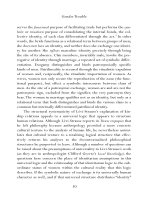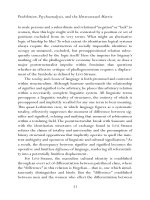GENDER TROUBLE 19
Bạn đang xem bản rút gọn của tài liệu. Xem và tải ngay bản đầy đủ của tài liệu tại đây (20.57 KB, 1 trang )
Gender Trouble
met. Thus, I arrived at a second view of universality in which it is
defined as a future-oriented labor of cultural translation.13 More
recently, I have been compelled to relate my work to political theory
and, once again, to the concept of universality in a co-authored book
that I am writing with Ernesto Laclau and Slavoj Zˇizˇ ek on the theory of
hegemony and its implications for a theoretically activist Left (to be
published by Verso in 2000).
Another practical dimension of my thinking has taken place in
relationship to psychoanalysis as both a scholarly and clinical enterprise. I am currently working with a group of progressive psychoanalytic therapists on a new journal, Studies in Gender and Sexuality, that
seeks to bring clinical and scholarly work into productive dialogue on
questions of sexuality, gender, and culture.
Both critics and friends of Gender Trouble have drawn attention to
the difficulty of its style. It is no doubt strange, and maddening to
some, to find a book that is not easily consumed to be “popular”
according to academic standards. The surprise over this is perhaps
attributable to the way we underestimate the reading public, its capacity and desire for reading complicated and challenging texts, when the
complication is not gratuitous, when the challenge is in the service of
calling taken-for-granted truths into question, when the taken for
grantedness of those truths is, indeed, oppressive.
I think that style is a complicated terrain, and not one that we unilaterally choose or control with the purposes we consciously intend.
Fredric Jameson made this clear in his early book on Sartre. Certainly,
one can practice styles, but the styles that become available to you are
not entirely a matter of choice. Moreover, neither grammar nor style
are politically neutral. Learning the rules that govern intelligible
speech is an inculcation into normalized language, where the price of
not conforming is the loss of intelligibility itself. As Drucilla Cornell,
in the tradition of Adorno, reminds me: there is nothing radical about
common sense. It would be a mistake to think that received grammar
is the best vehicle for expressing radical views, given the constraints
xviii









